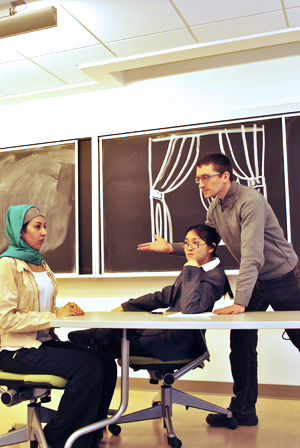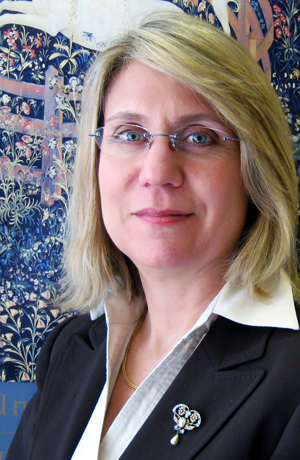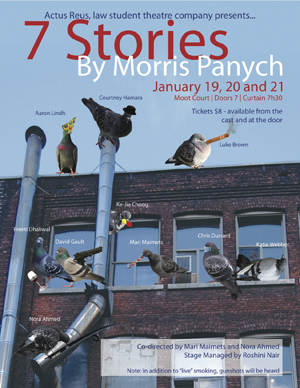Everyone has a story to tell and many of these stories can be found in the unexpected domain of legal cases, real or literary. This month’s Focus online cover story looks at three initiatives with ties to the Faculty of Law that examine the meeting of fact with fiction.
Nora Ahmed, a third-year student at the Faculty of Law, travels cautiously: she has had her passport taken away by customs and immigration officers, her baggage removed from a plane, and been warned that she may be brought in for questioning by the FBI.
Ahmed’s family is Muslim and that fact, along with her surname, generates assumptions about her identity.

Ahmed is also one of three students from the Faculty who will be performing an excerpt of Belgian law professor François Ost’s play, Antigone Voilée – a reprise of the Greek myth that recasts the protagonist as a veiled young Muslim woman named Aïcha – as part of this year’s Wainwright Lecture on January 24.
“When I first read the script, I thought, ‘What an honour to be acting in this production,’” Ahmed said during a rehearsal in early January. “As someone who has had [these] experiences, it’s nice to know that these issues are being talked about and weighed.”
“We come to law school and we study cases but… we don’t always go back and question how the story is conveyed,” she added. “This approach opens us up to thinking about something we sometimes gloss over.”
This year’s Wainwright Lecture takes as its theme this very relationship between law and literature and Professor Ost, a renowned jurist, philosopher and writer, will be giving the lecture, entitled, “Le marchand de Venise: Le pari et la dette, le jeu et la loi.” He will also be giving a Civil Law Workshop under the title « Intraduisible? Qu’entendez-vous par là? ».
Daniel Boyer, head librarian at the Gelber Library and also the chair of the Wainwright Committee, suggested the student performance as a way to weave the literary, dramatic and legal dimensions of this year’s lecture together.
Literature made up and literature made real *
During their January rehearsal, the three students taking part in the performance of Antigone Voilée subjected every aspect of their excerpt of the play to discussion, from Aïcha’s age (13? “Cégepper?”) to costumes (turquoise scarf or white?) to body posture (arms crossed, finger pointing, or leaning forward?).
“In preparing to act out this scene, we’ve had discussions about every action,” said Ahmed’s fellow actor, Sao-Mai Nguyen. “Are we sitting or standing, showing openness or closed off – it helps us to see every aspect of these individuals.”
Looking at law through literature also presents unusual opportunities for learning about legal cases, says Helena Lamed, who taught a course at the Faculty on literary and linguistic approaches to law in the fall of 2010.

Her students read literary texts such as Kafka’s The Trial, Euripides’ Medea, as well as The Merchant of Venice, and discussed the choice of words in judgments, scrutinizing, for example, the absence of the word “torture” in the Supreme Court decision in Canada (Prime Minister) v. Khadr.
“The aim of the course was to do some reading of literature after the students [who are in second-year or above] have spent at least a year reading almost exclusively law,” she explained, adding that literary texts sometimes allow authors to “be critical and to put a distance to the subject that the law text cannot.”
Broaching social dilemmas literarily; legally
Rowan Kunitz, who took Lamed’s class and who also has a part in Antigone Voilée, says that literary interpretations of legal cases help him better understand the interpretations he himself brings to law.
Describing the play’s climactic scene, in which Aïcha passionately questions a school board decision to ban the wearing of religious symbols, including headscarves, Kunitz notes that this decision is not simply vilified and dismissed.
“The best part about the play is that it’s balanced,” he noted during the rehearsal. “The men [making this decision] aren’t just foils – they’re saying, ‘Tolerance, for us, is equality,’ and [their position reflects] how hard it can be for a society to deal with these issues.”
Analyzing questions about social policy and legal affairs through literature also allows the audience access to the cultural weight of the subject, said Leigh Yetter, associate director of the Institute of the Public Life or Arts and Ideas (IPLAI).
Yetter is coordinating a lecture series at the Westmount Public Library that kicks off on January 18, designed to pose these questions to the general public. The series of six lectures looks at six significant trials, literary and historical, from the trial of Socrates to that of Slobodan Milosevic.
“What’s interesting in looking at these trials is looking at what the defendant is accused of having done, why that was so important in that time and how we relate to that in our own historical moment,” she explained. “How have those outcomes informed the development of laws related to that story?”
Law and literature: Happily ever after?
The basic act of reading incorporates elements of literary analysis that everyone absorbs with their first fairytale, Lamed pointed out. “We started to read by reading stories so I think, in a sense, we approach texts as stories.”
Whether we are asking, “What does this story say and, well, what does it mean?” or posing the same queries of a contract, Lamed said, “all of those are questions that we’re used to answering in thinking about storytelling. The relationship between law and literature is there all the time.”
Law and literature events coming up at the Faculty of Law
Beginning January 18: Great Trials Lecture Series

This public lecture series considers a collection of history-making trials across time to examine the social and political contexts in which they took place. Organized by the Institute for the Public Life of Arts and Ideas. For more information:
January 19-21: 7 Stories, by Morris Panych
In addition to the Wainwright performers, the Faculty also boasts its own theatre company, Actus Reus, which will stage a run of Morris Panych’s comedy, 7 Stories, from January 19 to 21 in New Chancellor Day Hall. Please see the Faculty’s Events Calendar for more details.
January 24: Wainwright Lecture
François Ost, professor at the Facultés universitaires Saint-Louis (Brussels, Belgium), will present a judicial study of Shakespeare’s Merchand of Venice. Please see the Faculty’s Events Calendar for more details.
*From Elaine Scarry, “The Made-Up and the Made-Real,” in Field Work: Sites of Literary and Cultural Studies. (As cited in Desmond Manderson, “‘As if’ – the Court of Shakespeare and the Relationships of Law and Literature,” in Law, Culture and the Humanities. (2008) 4:3.
